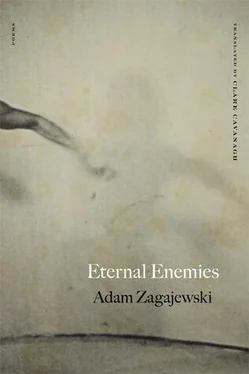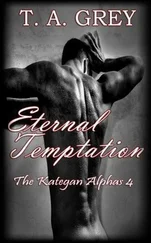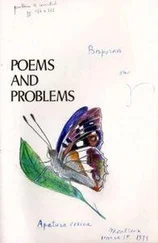TO ANNA MARIA AND KAROL BERGER
It’s just a voice.
It’s just a voice, and we don’t know
if it still belongs to a body,
or to the air alone.
The voice of a girl journeying
to Carlisle in a used Morris.
Just think, how many different voices
sounded in her life’s brief span.
Goebbels’s hysterical cry.
The moaning of the wounded, prisoners’ whispers.
Declamations in school auditoriums
(epics praising the tyrant).
So many lies in our throats.
She died of cancer,
not from hunger like Simone Weil,
not in a camp like Mandelstam.
She never studied in a conservatory
and yet the purest music
speaks through her.
She liked the songs of Schubert and Mahler,
Bruno Walter counseled her.
A girl’s voice,
innocent, sings Handel’s arias.
Listening, you think
here was a chance
for a better human race,
but the record ends
and you return to your usual mistrust—
as if the song promised too much,
more than silence or exhaustion.
In the beginning, freezing nights and hatred.
Red Army soldiers fired automatic pistols
at the sky, trying to strike the Highest Being.
Mother cried, perhaps remembering
the sentimental stories of her childhood.
Coldwater Street ran beside the river
as if trying to outrace it—
or to reach its distant sources,
still pure beyond a doubt,
recalling the dawn’s joy.
If life is a dream,
then the phoenix may actually exist.
But in Krakow life revived
under the sign of common pigeons:
in the Planty Gardens, alongside veterans
clad in the tattered uniforms
of at least three armies,
young beauties made appearances,
and music-loving plane trees donned
their finest new foliage outside Symphony Hall.
Should one honor local gods?
A beggar at the marketplace in Lucca
moved from stand to stand
garnering tributes — proud as Diana.
It’s more difficult to find nymphs
where we live, though,
and great Pan didn’t leave his calling card.
Important memories — stern monuments
to monotheism — were inscribed
only in the trees and on church walls.
We tried courage, since there was no exit.
We tried cunning, but it failed.
We tried patience and fell asleep.
We wrote poems like leaflets and leaflets
like pages from burgeoning epics.
Dreams grew like hibiscus flowers.
Dark wells opened in the night.
We tried cynicism; some of us succeeded.
There was great joy, don’t forget.
We tried time; it was tasteless, like water.
Finally, much later, for unknown
reasons, the clocks began
to revolve ever faster above us,
as in archival, silent films.
And life went on, inevitable life,
so skeptical, so practiced,
coming back to us so insistently
that one day we felt the taste of ordinary failure,
of common tragedy upon our lips,
which was a kind of triumph.
YOU MUST BE SOMEWHERE, RIGHT? — NICK FLYNN
Birds (sandpipers) hop on the beach at Galveston.
“La plupart des hommes meurent de chagrin”—says Buffon
(as quoted in Volume One of Claudel’s diaries).
R. thinks American poets are unintelligent.
— Yet nobleness exists, if only in a painting:
Christ’s face in the Caravaggio at S. Luigi dei Francesi
(I couldn’t tear myself away, I couldn’t go).
It depends who, I answer: I defend American poets.
Summer, endless dusk, and then the stars like lanterns.
We discuss the emptiness of recent French poetry.
But “rien” is such a lovely word! Better than nothing.
Even the ocean seems happy at noon.
Forests burn: resin has its brief moment of bliss.
We eat ice cream on the café terrace. The speakers are playing “Yesterday.”
Notes from a civil war: truce or armistice?
Suddenly I move to Aix-en-Provence, I don’t know how.
Evening crowds on the streets, anticipation.
I push through a dense thicket of onlookers and ask:
What’s happening? God’s coming back. But it’s just a dream.
AMERICA’S SUN (FROM EICHENDORFF, FROM KRYNICKI)
Outside the window, America’s blinding sun.
In a dark room, at a table
sits a man, no longer young,
who thinks about what he’s lost
and what remains.
I am that man.
I try to guess what losses
the future holds.
I still don’t know what I’ll discover.
I saw the sea and oranges.
First snow — ladies and gentlemen, a moment’s silence please.
Breaking news: Bach woke again and sings.
Time kept its word (it always does).
Reading Milosz by an open window. The swallows’ sudden trill.
Chapels beneath the linden trees in summer; bees pray.
“Carpe diem.” He seized the day, but when he checked his prey that
evening, he found night.
— You really like libraries that much?
Carrots, onions, celery, prunes, almonds, powdered sugar, four large
apples, green are best (your love letter).
Don’t get carried away. To say that Orthodox liturgies lack humor!
The hospital — pale invalids in gowns beside a tanned, smiling surgeon.
Why do you always write about cities?
If only we read poetry as carefully as menus in expensive restaurants …
“Periagoge”—Plato’s notion of internal transformation.
The bulging Place de la Bastille — perhaps another Bastille is hiding
underneath.
Peonies like peasant girls in church.
“How can I miss you when you won’t go away?” (country song).
Varieties of longing; the professor counted six.
Sign on a bus: AIR-CONDITIONED. Day trips — Wieliczka, Auschwitz.
The homeless clinging to radiators at a railroad station in December.
Vermeer’s painting with a woman sitting safely on the stoop and
knitting: behind her a dark interior, in front, the street and light.
Irreconcilable.
The sun hurts, says the boy in the park.
B., reproachfully: I lived there, you know, and I’d never say there was
too much of Lvov!
Everything returns. Inspiration wanes and returns. Desire.
Comedy and tragedy; Simone Weil sees only tragedy.
Red poppies and black snow.
The smile of a woman, no longer young, reading on the train to Warsaw.
Oh, so you’re the specialist in high style?
Delphi, full of tourists, open to mysteries.
The sea was angry at midnight: furious, to be frank.
And the Holocaust Museum in Washington — my childhood, my wagons,
my rust.
May evening: antennas in the rain.
Down Kanonicza Street screaming you sonofabitch.
Dolphins near Freeport: their favorite, ancient motion, like the symbol
scholars use for iambs.
A theater too tiny to hold Bergman’s film.
Escape from one prison to the next.
After the announcement “zurückbleiben” at a subway stop in Berlin, a
quiet moment — the sound of absence.
Swifts in Krakow, stirred by summer, whistle loudly.
A weary verb goes back to the dictionary at night.
Mama always peeked at the novel’s last page — to see what happened …
Truth is Catholic, the search for truth is Protestant (W.H. Auden).
Some experts predict that by the twenty-first century’s end people will
no longer die.
Open up.
Pay the phone and gas, return the books, write Clare.
In the plane after dinner two pudgy theologians compare their pensions.
Читать дальше












